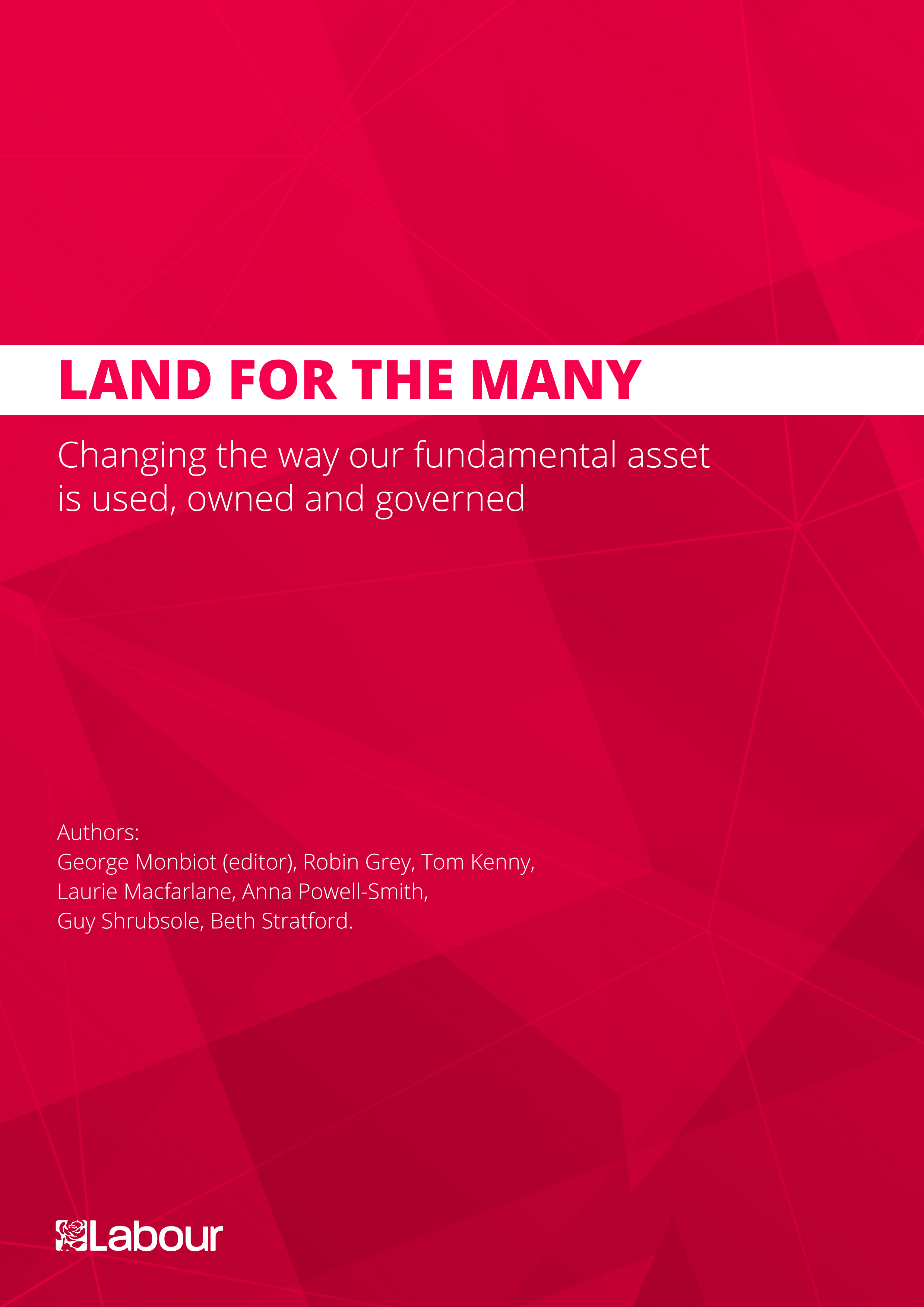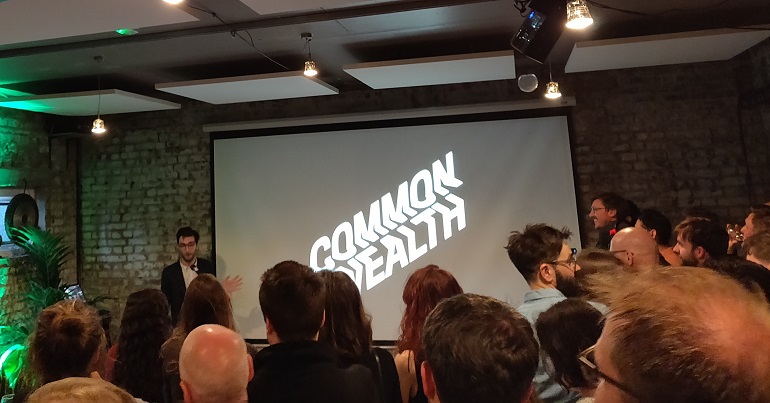Talking Points: June 2019
Posted on 09 Jul 2019 Categories: Blog, Climate crisis, Local initiatives, New economic models, Social Security, Talking Points, Wellbeing
by Rethinking Poverty
This month’s Talking Points reflects on the causes of inequality and puts forward some suggestions for tackling poverty rather than just more ‘bad news’. We also look at the secret of wellbeing and the development of new left economics, and offer some inspiration from the UK and the US.
Causes of inequality
 If you want to tackle inequality, ‘then first change our land ownership laws’ says George Monbiot. Land for the Many, a new report to the Labour Party written by Monbiot and six others, focuses on ‘the neglected issue of land ownership’. At the heart of the problem is land values, which have risen by 412 per cent in the UK since 1995. A slew of practical proposals includes creation of a new body, the Common Ground Trust, to help stabilise land prices and make homes more affordable.
If you want to tackle inequality, ‘then first change our land ownership laws’ says George Monbiot. Land for the Many, a new report to the Labour Party written by Monbiot and six others, focuses on ‘the neglected issue of land ownership’. At the heart of the problem is land values, which have risen by 412 per cent in the UK since 1995. A slew of practical proposals includes creation of a new body, the Common Ground Trust, to help stabilise land prices and make homes more affordable.
Meanwhile Jeremy Corbyn says he will drop social mobility as the Labour goal, ending 40 years of political consensus about its centrality, given that it seems to be all too compatible with ever greater and more entrenched inequality. He wants to replace ‘the idea that the brightest, most talented young people must have the opportunity to succeed, with a demand that all children be allowed to flourish’.
Finally, Jonathan Aldred looks at the attitudes that lie behind policies that make growing inequality possible. Inequality in richer countries is largely down to government decisions, he says, and these decisions can be changed. ‘However, we have to want to control inequality.’ When inequality rose in the UK in the 1980s, ‘More people became convinced that generous welfare benefits make poor people lazy and that high salaries are essential to motivate talented people … people cope with high inequality by convincing themselves it is fair after all … So inequality may be self-perpetuating in a surprising way. Rather than resist and revolt, we just cope with it. Less Communist Manifesto, more self-help manual.’
Solutions to poverty?
Alongside the expected stream of news items on worsening poverty – a study showing one in five UK children in ‘devastating’ persistent poverty; Sure Start centres facing cuts and closure despite proven benefits for the most disadvantaged; the lack of any meaningful safety net for people with disabilities; a trebling in the removal of homeless camps – there are practical suggestions about what could be done to improve the situation.
 A new report from CPAG provides a blueprint for making universal credit fit for families. A modest package of reinvestment in children’s benefits would lift 700,000 children out of poverty by 2023, it says. Of all the changes modelled in the report, scrapping the two-child limit would lift the most children from poverty per pound of social security spending. CPAG has now joined with over 50 organisations in the All Kids Count campaign to call for the two-child limit to be lifted.
A new report from CPAG provides a blueprint for making universal credit fit for families. A modest package of reinvestment in children’s benefits would lift 700,000 children out of poverty by 2023, it says. Of all the changes modelled in the report, scrapping the two-child limit would lift the most children from poverty per pound of social security spending. CPAG has now joined with over 50 organisations in the All Kids Count campaign to call for the two-child limit to be lifted.
Meanwhile the Living Wage Foundation has launched the Living Hours pledge – by which employers guarantee a certain number of hours to people on zero hours contracts, as a way of countering the scourge of low-paid, insecure work suffered by more than 5 million people in Britain.
In Scotland, the government has announced that it will be fast-tracking the new Scottish Child Payment, an additional £10 a week for children in families on low incomes, which will begin roll out in 2021. When we asked people with experience of living in poverty what £10 a week per child might mean, ‘we were told that it would help with the basics of food and clothing and could allow them to occasionally say “yes” to events like birthday parties, days out as a family and some school trips,’ writes JRF’s Emma Congreve.
‘It’s a miracle,’ writes Jon Henley of Helsinki’s radical solution to homelessness, Housing First. Finland is the only country in Europe where homelessness is falling.
UBI or UBS, or both, could be part of the solution, but which is more important? While Ian Gough, writing in the Political Quarterly, makes the moral case for UBS, Stewart Lansley emphasises the importance of ‘a guaranteed and unconditional income floor’, below which no one would fall. Of course we need services and income, says Andrew Percy, emphasising the undesirable consequences of introducing income before services.
The secret of wellbeing
Swedes rate their general satisfaction with life more highly than people in most OECD countries. The reason lies partly in the approach to work-life balance. In 2016, Sweden’s employment rate was one of the highest in the OECD, but only 1 per cent of Swedish employees regularly work more than 50 hours a week, one of the lowest rates in the OECD. Sweden has also been experimenting with six-hour work days, flexible work arrangements and shared parental leave.
Still on the topic of work-life balance, a new study by the University of Cambridge concludes that getting a job reduces our risk of mental health issues by 30 per cent. However, the mental-health benefits kick in after eight hours of paid work a week, but don’t increase any more after that.
The UK should stop obsessing over GDP and adopt a broader range of indicators when deciding how to spend money, writes Dan Button in the Guardian. ‘Wellbeing is more telling.’ One truth to emerge from 63 Up, ITV’s documentary series following a group of people through life, is that ‘we are eventually sustained by who we love, not by what we achieve’, writes Tim Adams. A step in the right direction is Labour’s proposed Future Generations Wellbeing Act for England, a national law to ensure that new policy decisions are gauged against people’s future health and wellbeing.
New left economics
‘Since the 70s, the left has changed how many people think about prejudice, personal identity and freedom. It has exposed capitalism’s cruelties … But it has not been able to change fundamentally how wealth and work function in society – or even provide a compelling vision of how that might be done. The left, in short, has not had an economic policy.’ So writes Andy Beckett in the Guardian, where he sketches ‘an emerging network of thinkers, activists and politicians’ who have begun to construct a new kind of leftwing economics. This new economics will be based on ‘the redistribution of economic power, so that it is held by everyone – just as political power is held by everyone in a healthy democracy’. In April a new economics thinktank, Common Wealth, was launched by Mathew Lawrence with the aim of drawing all the strands of this movement together.

Mainstream economics is failing us badly when it comes to climate change. To address climate change, says Ed Miliband, ‘we need to shift the whole story: from a tale of sacrifice and blame to a vision of hope and common endeavour. We need to demonstrate that action will benefit us all in the here and now.’ Meanwhile Edward Fullbrook asks what economists, and students of economics, can do about the fact that mainstream economics says nothing about the relationship between human activities and the earth’s system.
Inspiring local solutions in the UK …
While John Harris takes us on a tour of ‘the independent groups from Devon to London who are seizing control’, Michael Edwards visits Gone to the Dogs, Paul Higgins’ canine-friendly café in Carlisle. ‘Through “pay-it-forward” fundraising and “creative up-cycling” to re-use resources, Higgins has made the café a centre for community in which money builds connection instead of division.’
… and the 1968 Poor People Campaign revived in the US
One hundred and forty million poor and low-income people in America are ‘a $400 emergency away from not being able to pay their bills next month’. The Poor People Campaign was relaunched last year to build a broad coalition committed to restructuring the American economy. ‘We adjourned our Congress in the nation’s capitol this week with a commitment to go home to our communities and build a movement that will bring tens of thousands of our neighbors back next summer for a Mass Poor People’s Assembly and Moral March on Washington. By demonstrating the power of an electorate that has been ignored, we will demand that both parties address the economy that isn’t working for most of us,’ writes the Rev Dr William Barber II, campaign co-chair.
‘Talking Points’ is collated by Caroline Hartnell, who convenes the Rethinking Poverty blog.
Want to keep up-to-date with more articles like this? Sign up to our newsletter.
Posted on 09 Jul 2019 Categories: Blog, Climate crisis, Local initiatives, New economic models, Social Security, Talking Points, Wellbeing
